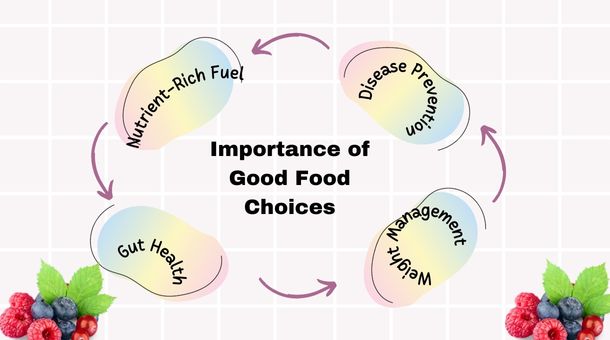“The First Wealth Is Health.”
– Ralph Waldo Emerson, Essayist, Lecturer And Poet –
In a world filled with countless options and endless distractions, one fundamental choice stands out as a beacon of hope for a healthier, happier life – the choice to eat well.
“Eat Well, Live Well: The Transformative Power of Nutritious Choices” is an exploration of the remarkable impact that the food we consume can have on our overall well-being.
Join me on this journey of discovery as I will unveil the secrets to a vibrant and energetic life, It’s time to embrace the transformative power of nutritious choices and unlock the path to a better you.
What Defines Healthy Eating?
Healthy eating is characterized by a diet that prioritizes the consumption of fruits, vegetables, whole grains, and fat-free or low-fat dairy products.
It also encompasses a diverse range of protein sources, including seafood, lean meats, poultry, eggs, legumes, soy products, nuts, and seeds. Furthermore, healthy eating involves limiting the intake of added sugars, sodium, saturated fats, trans fats, and cholesterol.
The Importance of Good Food Choices

Good food choices are essential for several reasons, as they have a profound impact on our health, well-being, and quality of life.
Here I ‘am highlighting some key points that highlight the importance of making wise food choices:
Nutrient-Rich Fuel
Good food choices provide our bodies with the essential nutrients, vitamins, and minerals needed for optimal function. This nourishment is the foundation for overall health and vitality.
Disease Prevention
A diet rich in whole foods, fruits, vegetables, and lean proteins can reduce the risk of chronic diseases such as heart disease, diabetes, and certain cancers.
Weight Management
Making healthy food choices helps maintain a healthy weight, reducing the risk of obesity and associated health issues.
Energy and Mental Clarity
Proper nutrition supports energy levels, cognitive function, and mental well-being, improving productivity and focus.
Gut Health
A balanced diet with fiber and probiotics supports a healthy gut microbiome, which is linked to improved digestion, immunity, and even mood regulation.
Longevity
Studies show that a nutritious diet can contribute to a longer, healthier life by promoting longevity and ageing gracefully.
Emotional Well-Being
Good food choices can positively affect mood and emotional well-being, offering comfort and satisfaction.
Environmental Impact
Choosing sustainable, eco-friendly food options can reduce your carbon footprint and contribute to a healthier planet.
Mental Health and Good Food

The connection between mental health and good food is a topic of growing interest and research in recent years. Here are some key points to consider regarding the impact of nutrition on mental well-being:
Nutrients and Brain Function
The brain requires a variety of nutrients to function optimally. Essential nutrients, such as omega-3 fatty acids, antioxidants, vitamins, and minerals, play a crucial role in cognitive function, mood regulation, and overall mental health.
The Gut-Brain Connection
Emerging research suggests a strong link between the gut and the brain. A healthy gut microbiome, influenced by diet, can have a significant impact on mental health, including anxiety and depression.
Mood and Food
Certain foods can directly affect mood and energy levels. Consuming a balanced diet with complex carbohydrates, lean proteins, and healthy fats can help stabilize blood sugar levels and reduce mood swings.
Inflammation and Mental Health
Chronic inflammation, often driven by a poor diet, has been associated with conditions like depression and anxiety. A diet rich in anti-inflammatory foods can potentially alleviate these symptoms.
Hydration and Mental Clarity
Dehydration can lead to cognitive difficulties and negatively affect mood. Proper hydration is essential for maintaining mental clarity and focus.
Eating Disorders and Mental Health
Eating disorders, such as anorexia, bulimia, and binge eating, are closely tied to mental health issues. Seeking professional help and support is crucial for those dealing with these conditions.
Mindful Eating
Practising mindful eating, which involves being present during meals and paying attention to hunger and fullness cues, can contribute to a healthier relationship with food and, in turn, support mental well-being.
Overall Well-Being
A diet that supports physical health can also boost self-esteem and body image, contributing to improved mental health and overall well-being
How do you start eating healthy?
- Base your meals on higher fibre starchy carbohydrates. …
- Eat lots of fruit and veg. …
- Eat more fish, including a portion of oily fish. …
- Cut down on saturated fat and sugar. …
- Eat less salt: no more than 6g a day for adults. …
- Get active and be a healthy weight. …
- Do not get thirsty. …
- Do not skip breakfast.
Conclusion
Good food serves as the hidden catalyst for a vibrant and satisfying life. It extends beyond mere sustenance, becoming a way of life.
When you embrace the transformative potential of nutritious choices, you’re not just tending to your physical health; you’re also nourishing your mental and emotional equilibrium.
Let us honour good food as the cornerstone of a well-lived life and integrate it into our daily rituals. In doing so, your body, mind, and spirit will all express their gratitude.
FAQ
How can I integrate nutritious choices into my daily routine?
You can start by prioritizing fruits, vegetables, and whole foods while reducing sugar and saturated fats. Making gradual, sustainable changes is key.
What role does good food play in mental health?
Good food not only nourishes the body but also supports mental and emotional well-being, influencing mood and cognitive function.
Can good food choices enhance overall quality of life?
Yes, by choosing nutritious options, you can experience increased vitality, improved health, and a greater sense of well-being.
Can a good diet really prevent chronic diseases like heart disease and diabetes?
Yes, a good diet can play a significant role in preventing chronic diseases like heart disease and diabetes. A balanced and nutritious diet that includes plenty of fruits, vegetables, whole grains, lean proteins, and healthy fats can help reduce risk factors associated with these conditions.
Eat Well, Live Well: The Transformative Power of Nutritious Choices Eat Well, Live Well: The Transformative Eat Well, Live Well: The Transformative Power of Nutritious Choices Eat Well, Live Well: The Transformative Power of Nutritious ChoicesPower of Nutritious Choices Eat Well, Live Well: The Transformative Power of Nutritious Choices Eat Well, Live Well: The Transformative Power of Nutritious Choices

